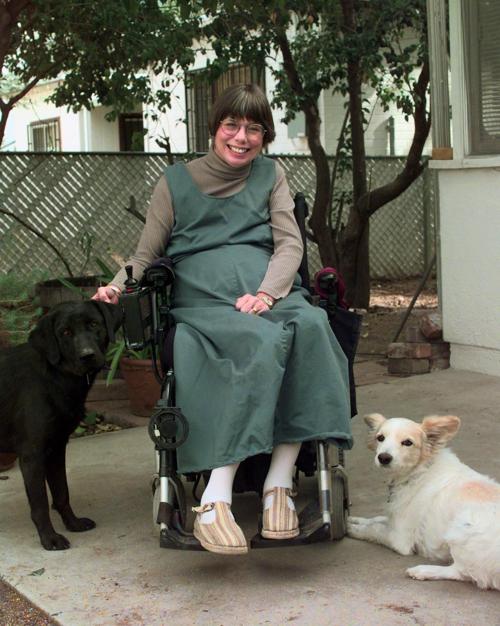Writer Nancy Mairs has written about death, flirted with death, and attempted to bring about her own death.
Saturday, she slipped gently into it, embracing it fully.
The award-winning writer died at her Tucson home, surrounded by family and friends. She had been in hospice care since August, when she had a stroke. Mairs was 73.
“She died very peacefully with her two black cats curled up beside her,” said her daughter, Anne Mairs.
“I thought she would live forever,” said poet Janice Dewey, who met Mairs when they were both in graduate school at the University of Arizona almost 40 years ago.
“She was extraordinary — an important word for her. She was a thinker and writer and speaker. Her readings were always riveting,” added Dewey.
Mairs’ fame initially came as a result of her 1986 book of essays, “Plain Text,” her Ph.D. dissertation from the UA.
Intensely personal and unflinchingly honest, Mairs wrote with eloquence, humor, and without a drop of self-pity as she chronicled her depression, agoraphobia, suicide attempts, sex life, children, feminism, and her multiple sclerosis.
Mairs was diagnosed with MS when she was 29, shortly after she and her husband, George, moved from Massachusetts so she could study creative writing at the UA. She had been limping and falling. The doctors initially thought she had a brain tumor. While it was determined she did not, it was a few years before MS was the diagnosis.
Her clear-eyed, often funny writing about the disease that required her to use a cane, then a scooter, and finally a wheelchair that she used for more than 20 years, made her a celebrity among the disabled community.
She had a no-nonsense approach to writing about her MS and its consequences: “Whatever you call me, I remain crippled,” she says in the “Plain Text” essay “On Being A Cripple.” But I don’t care what you call me, so long as it isn’t ‘differently abled,’ which strikes me as pure verbal garbage designed, by its ability to describe anyone, to describe no one.”
Her 1996 book of essays, “Waist-High in the World: A Life Among the Nondisabled,” chronicled how she lives, loves and struggles with MS.
The essays gave her a national presence among those who have and who study disabilities, and her writings are required reading in some college courses.
“Her writing just captured the disabled experience so well,” said Mairs daughter, Anne.
“So many have been touched by her writing and her perspective on the world. I loved her as a mom, but she also touched so many people’s lives in such a positive way.”
But it wasn’t just niche writing she did; her essays spoke to a much wider audience.
“Nancy engages the critical human questions of suffering, death and the possibilities of transcendence,” said writer Susan Aiken at a “pre-death” funeral for Mairs in October — an event she took great joy in planning and attending.
“She has earned her reputation as one of the most distinguished essayists in America not despite, but because of her own decades-long struggles with disasters that would break a lesser spirit — disasters she has transformed into art through her lucid, eloquent prose.”
Her commitment to those with disabilities and to literature brought her invitations to read from around the country. Though it was a struggle to travel, she would do it.
“The isolated and disabled and a number of others came and clustered around her,” said George, her husband of 52 years and her traveling companion.
Her energy and her eloquence is what convinced Dewey to make a 2003 documentary about Mairs, “Waist-High in the World.”
“I followed her all around the states for several years,” says Dewey. “She had a poetic determination. And she was provocative, and enjoyed being provocative. It’s something you see in her writing. It is so direct while at the same time so beautifully articulated. She provoked you into thinking about just about everything.”
Her fight for social justice was as important to her as her writing.
She and her husband worked with the Sanctuary Movement, Casa Maria and Central American refugees.
“They did a lot of peace and social justice work,” said long-time friend, Miriam Davidson. “She was very caring.”
Her friend will be deeply missed by many, said Davidson.
“She was powerful and so fearless, yet loving and warm. … She was an incredible inspiration, a great soul, a powerful spirit that we really miss.”
Mairs is survived by her husband, George, daughter Anne Mairs and son Matthew Mairs. Services are planned but not yet announced.





